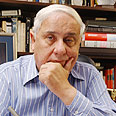
Eitan Haber
צילום: שלום בר טל
The search for relatives
Just like many members of his generation, Eitan Haber obsessed by search for relatives
My father, Yehuda, may he rest in peace, passed away on the night between a Saturday and a Sunday. Until the sun rose on that sad morning, I had plenty of time, used mostly for thinking and remembering. It was then that I discovered, to my great horror, that I barely know anything about my father, whose body was already taken to the morgue by then.
I knew where he was born (Stanislavov, Poland,) his year of birth (1913,) the year he moved to Israel (1935) and his job during my adulthood (an Industrialists Union official.) Yet that morning provided me with not even one answer to a thousand questions: Who were his parents? Did he have brothers or sisters? Did he have grandfathers or grandmothers? Where did they come from? What did they do in life? When and how did they perish in the Holocaust?
A day later, when the masses gathered for the funeral, I stared at the many people through my tears, and perhaps for the first time I realized something that was always hiding inside: I have no first-degree relatives: Neither a grandpa nor a grandma, neither uncles nor aunts. Nobody. I’m the only member of my immediate family.
Later, I discovered that this nagging absence of close relatives characterizes members of my generation – the generation born in the 1940s, in the midst of World War II; the generation whose relatives remained back there, between the piles of ashes in Auschwitz and the death pits of Stanislavov (and Kalish, my mother’s birthplace.)
Back then already, in my childhood, I saw the emergence of a phenomenon that I believe is only typical to members of that generation: A thorough search and endless digging in the annals of family history, coupled with the intensive and broad adoption of cousins who somehow found their way to us – and are my relatives to this day. They are the closest members of my family.
Clinging to radio
Thankfully, there are many of them. They’re my cousins and I’m proud of our connection. Yet there are questions I keep on asking without ever finding out the answers: In what way precisely are they my relatives? How are we related, and how are they related to each other? Did the parents of our parents spread across several European states? Did they get married for a second and third time? Who were they?As one who never uttered the words “grandma” or “grandpa,” and who certainly was never held up by them, I know that this phenomenon of adopting family members as “cousins” is only typical to members of my generation. Our children and grandchildren already have first-degree relatives.
Yet maybe now, more than ever, I understand one of the pictures I remember from home in my early years: Father, around noontime I believe, clinging to the big radio at home, and quiet prevailing throughout the one-bedroom apartment. Father listened with strict zeal to the radio show dedicated to locating relatives lost in the Holocaust. During these moments, one was not allowed to utter a word, lest father miss even one name.
Only in recent years I gave a new interpretation to my father’s actions – he was seeking relatives, so that we too shall have relatives.
So as we mark Holocaust Remembrance Day, here is one more picture for you, one of many, regarding the far-reaching effect of the Shoah on the generation who fortunately did not experience it personally. Perhaps this article will serve as a gesture of remembrance for my father, who I never really knew; the father I knew nothing about.










